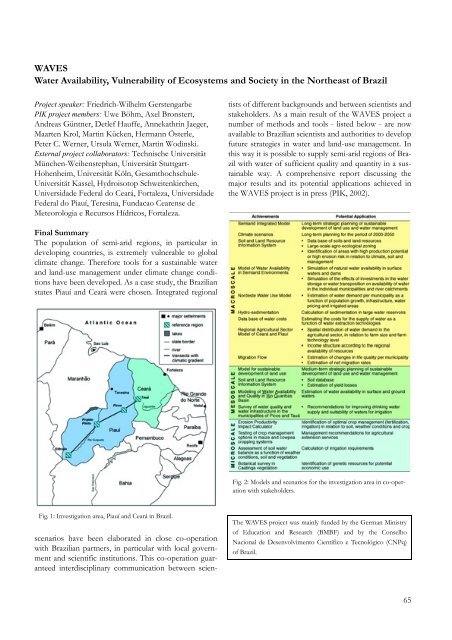PIK Biennial Report 2000-2001 - Potsdam Institute for Climate ...
PIK Biennial Report 2000-2001 - Potsdam Institute for Climate ...
PIK Biennial Report 2000-2001 - Potsdam Institute for Climate ...
You also want an ePaper? Increase the reach of your titles
YUMPU automatically turns print PDFs into web optimized ePapers that Google loves.
WAVES<br />
Water Availability, Vulnerability of Ecosystems and Society in the Northeast of Brazil<br />
Project speaker: Friedrich-Wilhelm Gerstengarbe<br />
<strong>PIK</strong> project members: Uwe Böhm, Axel Bronstert,<br />
Andreas Güntner, Detlef Hauffe, Annekathrin Jaeger,<br />
Maarten Krol, Martin Kücken, Hermann Österle,<br />
PeterC.Werner, UrsulaWerner, Martin Wodinski.<br />
External project collaborators: Technische Universität<br />
München-Weihenstephan, Universität Stuttgart-<br />
Hohenheim, Universität Köln, Gesamthochschule-<br />
Universität Kassel, Hydroisotop Schweitenkirchen,<br />
Universidade Federal do Ceará, Fortaleza, Universidade<br />
Federal do Piauí, Teresina, Fundacao Cearense de<br />
Meteorologia e Recursos Hídricos, Fortaleza.<br />
Final Summary<br />
The population of semi-arid regions, in particular in<br />
developing countries, is extremely vulnerable to global<br />
climate change. There<strong>for</strong>e tools <strong>for</strong> a sustainable water<br />
and land-use management under climate change conditions<br />
have been developed. As a case study, the Brazilian<br />
states Piauí and Ceará were chosen. Integrated regional<br />
Fig. 1: Investigation area, Piauí and Ceará in Brazil.<br />
scenarios have been elaborated in close co-operation<br />
with Brazilian partners, in particular with local government<br />
and scientific institutions. This co-operation guaranteed<br />
interdisciplinary communication between scien-<br />
tists of different backgrounds and between scientists and<br />
stakeholders. As a main result of the WAVES project a<br />
number of methods and tools - listed below - are now<br />
available to Brazilian scientists and authorities to develop<br />
future strategies in water and land-use management. In<br />
this way it is possible to supply semi-arid regions of Brazil<br />
with water of sufficient quality and quantity in a sustainable<br />
way. A comprehensive report discussing the<br />
major results and its potential applications achieved in<br />
the WAVES project is in press (<strong>PIK</strong>, 2002).<br />
Fig. 2: Models and scenarios <strong>for</strong> the investigation area in co-operation<br />
with stakeholders.<br />
The WAVES project was mainly funded by the German Ministry<br />
of Education and Research (BMBF) and by the Conselho<br />
Nacional de Desenvolvimento Científico e Tecnológico (CNPq)<br />
of Brazil.<br />
65

















